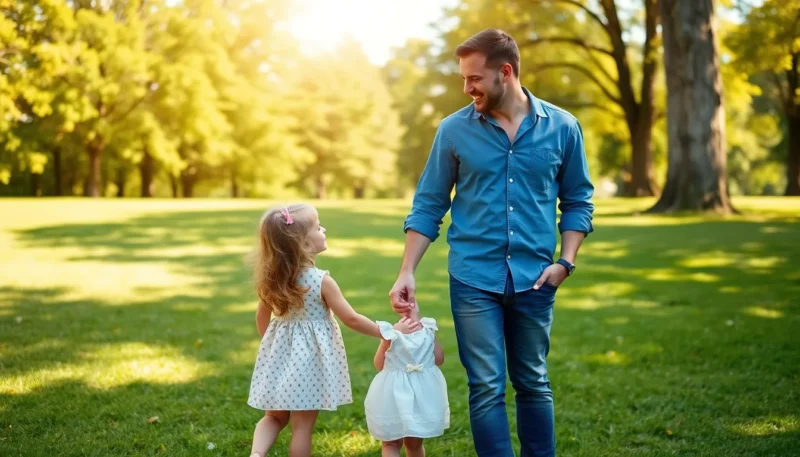
Parenting can feel like a never-ending rollercoaster ride, full of unexpected twists and turns. One moment, you’re basking in the glow of a sweet hug, and the next, you’re dodging flying toys during a meltdown. In this chaotic journey, humor is every parent’s secret weapon. It’s the glue that holds sanity together when the kids are bouncing off the walls like they’ve just discovered sugar.
Imagine sharing a laugh over the latest toddler tantrum or the joys of negotiating bedtime. Parenting humor not only lightens the mood but also builds connections with fellow parents. It’s a reminder that everyone’s in the same boat, navigating the wild waters of parenthood. So, buckle up and get ready to explore the hilarity that comes with raising little humans, because laughter truly is the best medicine for those sleepless nights and messy days.
Parenting Humor
Humor plays a crucial role in parenting, providing support during challenging times. It enhances connections among parents while lightening the mood during difficult moments.
Building Stronger Bonds
Shared laughter strengthens relationships among parents. It creates a sense of camaraderie, as individuals relate to each other’s predicaments. Stories of similar experiences, like forgetting a child’s birthday or navigating a messy mealtime, resonate deeply. These interactions foster trust and friendship, turning isolated parenting challenges into collective experiences. Group playdates filled with laughter also unite parents, transforming shared struggles into enjoyable memories.
Reducing Stress
Laughter lowers stress levels and alleviates pressure in parenting. When parents can joke about sleepless nights or unexpected messes, they shift focus from frustration to amusement. This perspective change creates a calming effect, making the stressful moments feel less overwhelming. Engaging in humorous conversations or sharing funny parenting memes acts as an emotional release valve. By embracing humor, parents can handle everyday chaos with a lighter heart and a more positive outlook.
Types Of Parenting Humor

Parenting humor comes in various forms that resonate deeply with the highs and lows of raising children. These humorous expressions offer relief and create connections among parents.
Jokes About Parenting
Jokes about parenting often highlight universal challenges. For instance, puns about sleep deprivation or quips about the chaos of family outings deliver relatable laughs. Many jokes poke fun at everyday situations like negotiating with toddlers or tripping over toys. Humor in these situations allows parents to bond over shared experiences. Parents enjoy sharing these jokes with friends, making light of their own struggles. Common themes include the exhaustion of late-night feedings and the bewilderment of balancing schedules. These comedic moments provide a needed reminder that others face similar trials.
Funny Parenting Memes
Funny parenting memes thrive on social media, showcasing humorous takes on parenting life. These memes often blend relatable scenarios with clever captions, capturing the essence of everyday challenges. Many memes depict the absurdity of juggling work and family responsibilities. Creative visuals and witty commentary resonate, making them shareable. Parents find comfort in seeing their experiences illustrated in a humorous light. Themes in parenting memes range from snack time chaos to the joys of unexpected messes. These quick, punchy formats provide a laugh in between hectic moments, cementing connections among parents navigating similar paths.
How To Incorporate Humor In Parenting
Humor plays a significant role in parenting, offering a lighthearted approach to daily challenges. Employing laughter often eases tension and fosters connections.
Light-Hearted Conversations
Engaging in playful dialogue with children nurtures warmth and understanding. Asking silly questions can prompt laughter and encourage imaginative responses. Joking about everyday mishaps creates shared experiences that parents and kids can enjoy together. Additionally, incorporating humor into routine conversations makes learning enjoyable. When discussing chores or responsibilities, adding a playful twist lessens resistance. Light-hearted banter enhances communication, helping parents relate to their children’s world. This approach not only diffuses frustration but also builds cherished memories.
Playful Discipline Techniques
Using humor as a discipline tool provides a fresh perspective. Rather than resorting to stern tones, parents can communicate expectations with playful jests. For instance, using funny consequences for minor misbehaviors can catch children’s attention more effectively. Imagining a “silly hat” for the next tantrum creates a moment of laughter while addressing behavior. Additionally, role-playing scenarios can help children grasp lessons in a relatable way. Making discipline enjoyable fosters cooperation and reduces conflicts. Through humor, parents cultivate an environment of joy and learning.
The Benefits Of Parenting Humor
Parenting humor offers numerous advantages that enhance family life.
Enhancing Family Dynamics
Laughter brings families closer together. Shared jokes create memories that resonate during both joyful and challenging times. Humor allows parents and children to bond over everyday frustrations, such as misplacing toys or dealing with sibling rivalry. Encouraging a light-hearted atmosphere fosters open communication, helping family members express their feelings more freely. When parents model humor, children learn to appreciate the lighter side of life, which strengthens relationships at home. Families often find that integrating humor into their daily routines turns mundane moments into cherished experiences.
Fostering Resilience In Kids
Childhood can be filled with trials, and humor plays a vital role in building resilience. Jokes about frustrating situations teach kids to approach problems with a positive mindset. Understanding that challenges can be managed with laughter fosters adaptability in children. Parents who share funny anecdotes from their own experiences help kids realize they aren’t alone in facing difficulties. Teaching children to find humor in their struggles equips them with coping strategies for future adversities. Moreover, when kids learn to laugh at themselves, they develop confidence and a sense of belonging within their families.
Conclusion
Parenting humor isn’t just a source of laughter; it’s a lifeline for parents navigating the ups and downs of family life. By embracing humor, they can transform chaotic moments into shared experiences, fostering deeper connections with their children and fellow parents. This light-hearted approach not only alleviates stress but also cultivates resilience in kids, teaching them to find joy even in challenging situations.
As parents continue to share their funny stories and relatable moments, they create an environment where laughter thrives. This camaraderie strengthens family bonds and nurtures a sense of belonging. Ultimately, humor becomes a powerful tool that enhances the parenting journey, making it not only manageable but also enjoyable.







